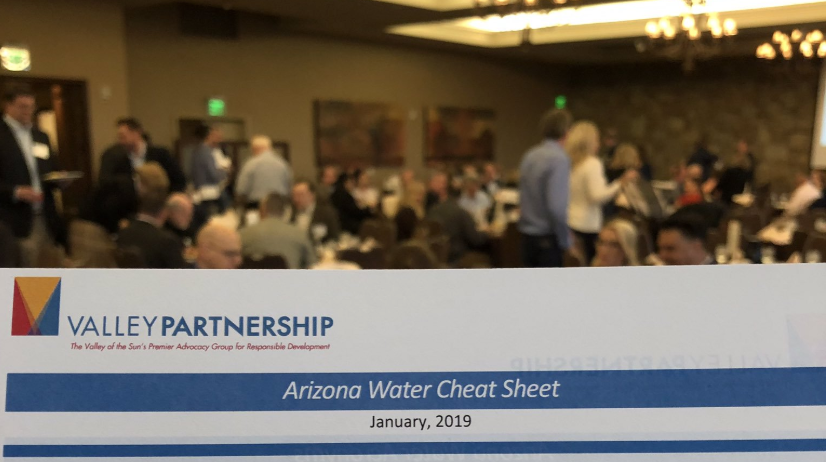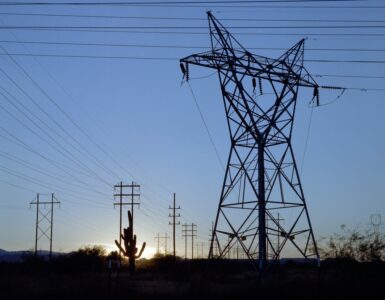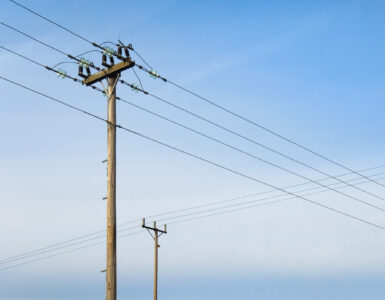State water leaders laid out the hard facts of Arizona’s water crisis to a crowd of 280 members of the real estate development community and others Friday at an event hosted by Valley Partnership, an active advocate for the industry.
History is in the making. An unrelenting 19-year drought is shrinking the “canyon maker,” the grand Colorado River that feeds seven states along the upper and lower basins. Arizona is racing along with the other states to fend off the first official water shortage and forced cuts to water supplies, likely next year.
For the development community, it’s a critical issue, Valley Partnership President and CEO Cheryl Lombard told a packed room at the Phoenix Country Club Friday.
“Water is an important economic development tool, and it’s our water security, for us as residents and as business owners,” said Lombard, who is a member of the statewide steering committee that worked feverishly – and contentiously – for the past six months to negotiate Arizona’s part of a seven-state Drought Contingency Plan (DCP) that lays out who will see reductions in water supplies when a shortage occurs.
Now, it’s in the state legislature’s hands. A legislative resolution must be approved to allow the State to sign onto the DCP by Jan. 31 or face federal takeover of the process. Arizona is the only state that requires legislative approval.
Getting the current plan through the legislature and approved by Congress is a top public policy goal for Valley Partnership this year, Lombard said.
Lombard invited four top water executives to speak about three water issues that affect the development community: the DCP, a deal to secure future water supplies for builders, and the water reliability in Pinal County after the takeover of Johnson Utilities.
The speakers were Arizona Department of Water Resources Director Tom Buschatzke; Central Arizona Project General Manager Ted Cooke; Gila River Indian Community Governor Stephen Roe Lewis; and Epcor USA President Joe Gysel.
All four urged everyone to support quick passage of the DCP at the Legislature.
“We need all of you to go to your favorite legislator and express your support for the implementation plan,” Buschatzke said. “It was put together very, very carefully. It’s a delicate balance that can’t be disturbed.”
The plan is designed to protect Lake Mead. It lays out how water will be shored up in the lake and who will receive forced reductions in supplies under a shortage. If the legislature fails to meet the deadline, it could end disastrously with a federal takeover and potentially years of litigation.
“The Department of Interior will not let Lake Mead crash,” warned Cooke. “We have a chance to do this on our own or the United States will step in.”
Cooke and Buschatzke, who co-chaired the statewide steering committee, have worked years to get the DCP implementation plan in place. Both emphasized it is merely a band-aid to secure water supplies through 2026. At that point, a new DCP must be renegotiated. Work is already in progress for the next drier phase.
“So this is an important step but it’s only a step. All those other problems will still exist,” Buschatzke said. “We have to plan for a drier future. This is the future.”
Gov. Stephen Roe Lewis of the Gila River Indian Community also spoke about the community’s role in the DCP and a deal to secure water for developers. Gila River has agreed to a $97.5 million, 25-year agreement that would allow builders to buy water from the tribe to replenish groundwater in the state’s growing megaregion.
That deal, however, hinges on the DCP approval at the legislature. Any amendments could “poison the fields” and cause it to fail, Lewis said.
“I’m optimistic the legislature will approve it but I want to be clear. Our support is not unconditional,” he said.
Gov. Doug Ducey has stated that he will not sign off on the DCP if provisions that protect Lake Mead are altered.
The final speaker at the event, Epcor USA President Joe Gysel, detailed the status of Johnson Utilities in Pinal County. After ongoing complaints and violations, Johnson was ordered last October to hand over financial and managerial control of its operations to Epcor. Epcor, an award winning water and wastewater company that serves approximately 360,000 customers in Arizona, is upgrading operations and has hired additional employees.
Gysel said that the company is investing $40 million to bring operations into compliance and replace and rebuild facilities.
“We need to rebuild the trust with customers,” Gysel said. “People need to know their utilities will provide them with safe quality water when they turn on the tap.”
For more details about Arizona’s part of the seven-state water shortage pact, go to: https://new.azwater.gov/lbdcp.
















Add comment